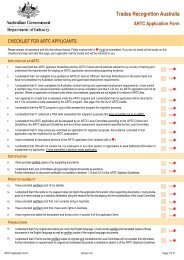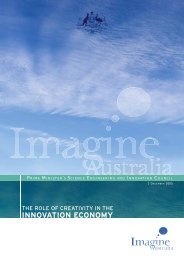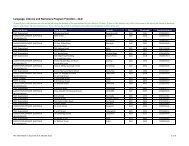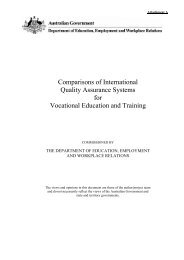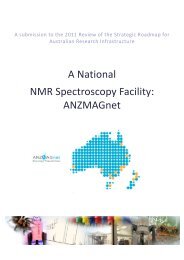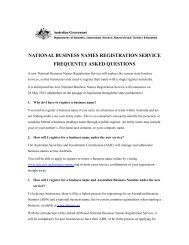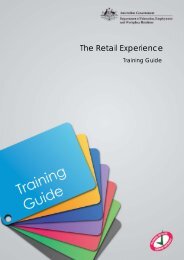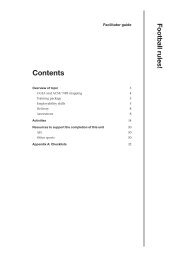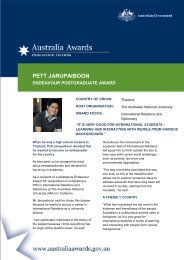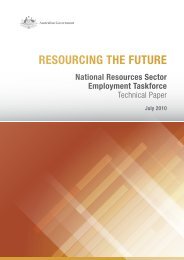National Survey of Research Commercialisation - Australian ...
National Survey of Research Commercialisation - Australian ...
National Survey of Research Commercialisation - Australian ...
You also want an ePaper? Increase the reach of your titles
YUMPU automatically turns print PDFs into web optimized ePapers that Google loves.
NATIONAL SURVEY OF RESEARCH COMMERCIALISATION<br />
for example number <strong>of</strong> licences executed and, in particular, US patents issued, our<br />
performance is below that <strong>of</strong> both the USA and Canada.<br />
While this latter finding may reflect, in part, differences in patenting strategies that have<br />
been adopted by organisations in different countries, it remains the case that Australia<br />
should aspire to a competitive position among nations that seek patent protection for<br />
their inventions in the USA.<br />
Australia’s relative position in securing US patent protection, as revealed in this report, is<br />
consistent with results from a previous study <strong>of</strong> the links between <strong>Australian</strong> patenting<br />
and basic scientific research which was commissioned jointly by the ARC and CSIRO.<br />
The report <strong>of</strong> that study, Inventing our Future, noted that the number <strong>of</strong> <strong>Australian</strong>invented<br />
US patents had grown slowly over the period 1979–1997, accounting for about<br />
0.45% <strong>of</strong> all US patents at the start <strong>of</strong> the period and about 0.50% <strong>of</strong> those patents at<br />
the end <strong>of</strong> the period. Over the same period, the share <strong>of</strong> US patents accounted for by<br />
a number <strong>of</strong> other countries grew much more rapidly. The study found that, calculated<br />
relative to GDP, Australia’s share <strong>of</strong> US patents was low relative to a number <strong>of</strong> other<br />
countries (Narin et al., 2000).<br />
The report <strong>of</strong> the <strong>National</strong> Innovation Summit held in February 2001 suggested that, in<br />
the long run, the licensing route to commercialisation rarely delivers substantial returns<br />
and, by contrast, the creation <strong>of</strong> spin-<strong>of</strong>f companies is likely to deliver far greater benefits<br />
in the longer term (Commonwealth Department <strong>of</strong> Industry, Science and Resources,<br />
2000). While there are opposing views on this, it is noteworthy that the country<br />
comparisons in this report indicate a research commercialisation strategy in Canada that<br />
appears to be focused on the formation <strong>of</strong> start-up companies.<br />
The results from the <strong>National</strong> <strong>Survey</strong> <strong>of</strong> <strong>Research</strong> <strong>Commercialisation</strong> provide an<br />
empirical basis for a debate about the balance between the various elements <strong>of</strong> our<br />
commercialisation activity in Australia, and about the most appropriate strategies that<br />
our publicly funded research organisations might pursue in order to maximise future<br />
returns on investment.<br />
The survey results indicate that, in Australia, a very high proportion <strong>of</strong> licences<br />
executed to start-up companies are exclusive. This suggests that the ability to grant<br />
exclusive licences is important to company start-up activity, which makes a significant<br />
contribution to the overall economic impact <strong>of</strong> licensing by universities, medical research<br />
institutes and CSIRO.<br />
Of the start-up companies reported in the survey, 91% had their headquarters in<br />
Australia. The survey revealed apparent differences in the pattern <strong>of</strong> equity holdings<br />
between research sectors — universities held equity in 79% <strong>of</strong> start-up companies<br />
formed as the result <strong>of</strong> licensing or assignment <strong>of</strong> their intellectual property, medical<br />
research institutes held equity in 67% <strong>of</strong> their start-up companies and CSIRO held equity<br />
in 26% <strong>of</strong> its start-up companies.<br />
The results <strong>of</strong> the survey indicate that Australia is on track to generate 250 start-up<br />
companies from its publicly funded research organisations over the five years to 2004, a<br />
five year target proposed by a working group <strong>of</strong> the Prime Minister’s Science, Engineering<br />
44



